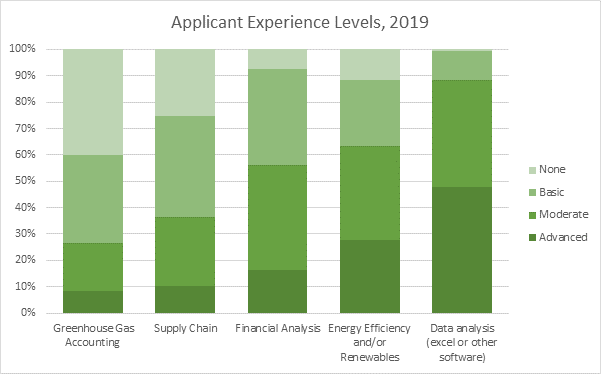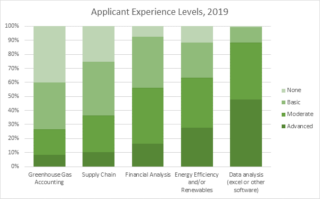- Resources
- What today’s CEOs need to know to attract and retain tomorrow’s leaders
Resources
What today’s CEOs need to know to attract and retain tomorrow’s leaders
Published: August 20, 2019 by EDF Staff
Yesterday, some of the most powerful CEOs in corporate America declared that driving shareholder value can no longer be their sole business objective. A group of 181 CEOs representing the Business Roundtable claimed that corporations have a responsibility to balance the needs of all their stakeholders – from employees to local communities.
Several societal trends have pushed corporations to look beyond their fiduciary responsibilities and consider their impact on society, including pressure from employees.
Nearly 40% of millennials – now the largest generation in the American workforce – report choosing a job because of the employer’s approach to corporate sustainability. Five years of statistics from EDF Climate Corps reflect this trend: Demand for climate-related jobs has nearly doubled in the last five years.
Millennials are different from previous generations in their preference for purpose over paycheck. They want to bring change.

Here are three insights I’ve identified from EDF Climate Corps’ pool of graduate student applicants that should matter to any CEO seeking to recruit and retain talent. The program receives over 1,000 applications each year and has an acceptance rate of 10%.
Applicants are increasingly diverse
For the last three years, just over half of our applicant pool identified as non-white. While Asian applicants consistently represent about a third of our pool, the number of black or African American applicants has doubled since 2014. The number of Hispanic or Latino applicants to the program has also increased.
Women have been applying to the EDF Climate Corps program at about the same rate as men over the last five years, but this year, women applicants surpassed men as the dominant gender by a small margin.
While this is just a sampling of the trends we’re observing, the lesson is clear: companies that incorporate diversity, equity and inclusion into their strategy will have a leg up on attracting the best talent. Our diverse group of selected fellows has proven this true. Employees with a wide array of skills, experiences and backgrounds bring with them new ideas and are more likely to unlock innovation.
More diverse companies can gain a competitive advantage and even improve the bottom line.
Applicants welcome interdisciplinary thinking
MBAs used to dominate our applicant pool, but that’s changing as students pursue educational tracks that allow for more interdisciplinary approaches to problem-solving.
Master of Science degrees – such as the popular MS in Sustainability Management – have gained ground in recent years and now make up the second most popular degree, representing nearly a quarter of all our applicants today. Those pursuing policy degrees, Master of Arts, Master of Environmental Management, PhD or dual degrees make up the majority of the remaining degree types we see.
This trend reflects changes in the corporate sustainability world as projects become more complex.
Energy projects in the low-hanging fruit category, such as lighting upgrades, have evolved into more sophisticated undertakings. Today‘s corporate sustainability projects may also include ambitious goal-setting and advocating for smarter policies.
This transition is increasing the demand for more interdisciplinary skills as reflected by the educational tracks our graduate students pursue.
Applicants are bringing more skills and experience

Nearly half of all applicants to the EDF Climate Corps program in 2019 had four or more years of prior work experience. They show the strongest experience with data analysis, energy efficiency and renewable energy.
Although only a small portion of applicants indicated moderate or advanced experience in greenhouse gas accounting, this field has grown relative to previous years and we expect that trend to continue in coming years.
It’s easy to see why: More than 600 companies so far have set or committed to set science-based emission targets with companies like Lyft, Evian and REI striving for carbon neutrality. Some turn to our program for help.
Lyft, for example, hired an EDF Climate Corps fellow to quantify its total greenhouse gas emissions.
“Matt’s work was critical to calculating Lyft’s carbon footprint and establishing the groundwork from which our sustainability program will be built,” wrote Lyft’s Director of Sustainability Sam Arons.
Future climate leaders will bring skills such as carbon accounting to their employer as more companies take action to cut supply chain emissions and set ambitious climate targets. They’re combining past experience with new skills to help companies deliver on their goals.
By aligning corporate values with those of America’s largest working generation, today’s CEOs will be well positioned to recruit top talent and build long-term value while continuing to generate a profit.
